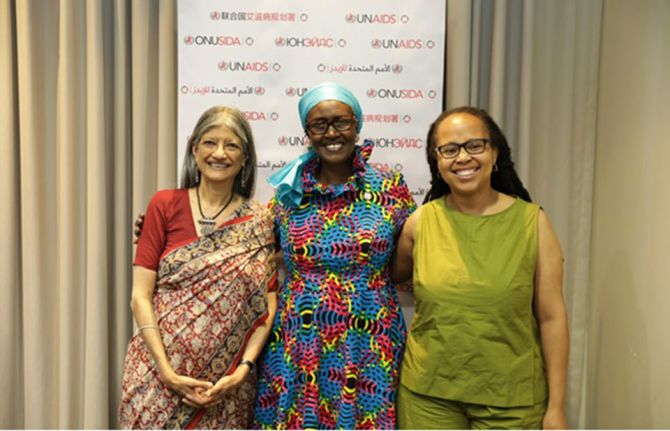



Press Release
UNAIDS executive director Winnie Byanyima addresses G20 Leaders’ summit in Johannesburg, warns that global inequalities are prolonging the AIDS crisis and other pandemics
21 November 2025 21 November 2025GENEVA/JOHANNESBURG, 21 November 2025— UNAIDS Executive Director and United Nations Under-Secretary-General Winnie Byanyima has warned G20 leaders that entrenched inequalities within and between countries are a threat to the whole world.
Noting that inequalities are prolonging the AIDS crisis and leaving the world vulnerable to future pandemics, she urged leaders to establish an International Panel on Inequality, which could support governments and multilateral agencies to develop national and international policies to address inequality.
“In a world pulled apart by extreme inequality, no one is safe,” said Ms Byanyima. “G20 leaders need to tackle the inequality emergency to build a safer world for all.”
Ms Byanyima will address the G20 Leaders’ Summit on 22 November in Johannesburg on behalf of the G20 Extraordinary Committee of Independent Experts on Global Inequality, commissioned by President Cyril Ramaphosa. The Committee, chaired by Nobel Economics Laureate Joseph Stiglitz, has called for the establishment of an International Panel on Inequality, inspired by the Intergovernmental Panel on Climate Change (IPCC). New analysis published by the Committee report shows that between 2000 and 2024, the world’s top 1% captured 41% of all new wealth, while just 1% went to the bottom 50%.
Amid steep cuts in donor funding for the global AIDS response, Ms Byanyima called on leaders to enable immediate action to address the unaffordable debt interest payments being paid by low- and middle-income countries, so that their governments can devote the resources that are needed to end AIDS and other pandemics. Developing countries are chokingon debt servicing, amounting to nearly $3 trillion. Servicing this debt deprives governments of revenues that are essential to fund investments in health systems and in the social determinants of health.
Ms Byanyima serves both as a member of the G20 Extraordinary Committee, and as the Convenor of the Global Council on Inequality, AIDS and Pandemics. Research released ahead of the G20 by each of the two expert groups demonstrates that persistent high inequality is a global emergency – stoking political instability, holding back the economy, and undermining public health.
Research by the Global Council shows that high levels of inequality, within and between countries, are making the world more vulnerable to pandemics, making pandemics more economically disruptive and deadly, and making them last longer; pandemics in turn exacerbate inequality, driving a cyclical, self-reinforcing relationship.
Evidence shows that more unequal countries have seen significantly higher COVID-19 mortality, higher rates of HIV infection, and higher AIDS mortality as they have struggled to mount effective pandemic responses.
Evidence also shows that social determinants of pandemics generate underlying vulnerability. In Brazil, for example, people without basic education were several times more likely to die from COVID-19 than those completing elementary school. In England, living in overcrowded housing was linked to higher mortality rates from COVID-19.
The damaging impact of entrenched inequalities between countries was illustrated during the height of the COVID-19 pandemic: while high-income countries were able to finance surges in health spending and economic mitigation measures and roll out vaccines, low-income countries, by contrast, were held back by severe financial constraints and were also forced to wait for vaccines, which hampered the COVID-19 response worldwide.
Ms Byanyima praised South Africa’s leadership of the G20, focused on “Solidarity, Equality, Sustainability”, for advancing international progress on access to medicines, on debt and financing, and for its drive domestically for universal health coverage through National Health Insurance, stating that “President Ramaphosa is lighting the way to a world that is both fairer and safer.”
“The evidence,” said Ms Byanyima, “is unequivocal: first, that inequality is a danger to the world, and that reducing inequalities within and between countries will make everyone safer; second, that these inequalities can be overcome, if leaders act together. Inequality is not fate; it is a disastrous collective international policy choice that leaders can choose now to unmake.”
/ENDS
Notes for editors
UNAIDS Executive Director Winnie Byanyima was a leader of the report of the Global Council on Inequalities, AIDS and Pandemics, and of the report of the G20 Extraordinary Committee of Independent Experts on Global Wealth Inequality.
The Global Council on Inequality, AIDS and Pandemics is a high-level initiative convened by UNAIDS to confront how inequalities drive pandemics—and how pandemics, in turn, deepen inequality. Convened by Winnie Byanyima, the Council is co-chaired by Chairperson of the One Economy Foundation and Namibia’s former First Lady Monica Geingos, Director of the UCL Institute of Health Equity Professor Sir Michael Marmot, and Nobel laureate Joseph E. Stiglitz. It brings together leaders across economics, public health, human rights and finance to build a policy environment in which inequalities can be addressed so the world can end AIDS and better prepare for and respond to future pandemics.
The G20 Extraordinary Committee of Independent Experts on Global Inequality report, commissioned by President Ramaphosa as G20 President, is authored by the 2025 G20 Extraordinary Committee of Independent Experts on Global Inequality, led by Joseph E. Stiglitz, and joined by Adriana Abdenur, Winnie Byanyima, Jayati Ghosh, Imraan Valodia and Wanga Zembe-Mkabile.
